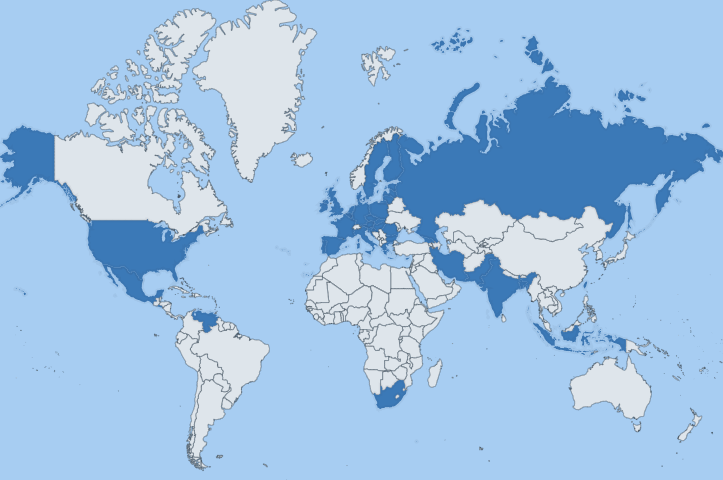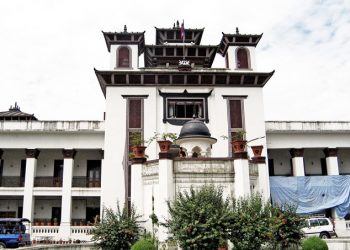The past several years saw a dangerous backslide in democracy as wars, coups and restrictions on speech eroded civil liberties around the world.
Yet in 2024, a record-setting 2 billion voters in 50 countries will head to the polls.
Ranging from hotly contested races to carefully stage-managed affairs, many of these elections may drastically affect the shape of global politics for years.
Bangladesh
Bangladesh’s election, scheduled for January 7, faces a boycott from the main opposition party.
The Bangladesh National Party, or BNP, many of whose leaders and activists have been jailed, contends that fair elections are impossible under the ruling Awami League, and has demanded a caretaker government to oversee the process — a request that has been rejected as unconstitutional.
With the elections set to proceed with only token independent opposition candidates, Prime Minister Sheikh Hasina seems certain to win a fifth term, but fears of street violence between government forces and BNP supporters persist.
Taiwan
While the threat of a Chinese military takeover continues to loom in the background, Taiwan’s January 13 elections are more likely to focus on domestic issues such as youth unemployment and rising costs.
The ruling Democratic Progressive Party candidate, current Vice President Lai Ching-te, is seen as more confrontational toward China than Hou Yu-ih, his opponent from the Kuomintang Party.
Officials have warned about Chinese election interference to prevent a Lai victory. Both parties, however, oppose forced reunification and are committed to maintaining the status quo rather than pushing for immediate formal recognition and independence.
The recently formed Taiwan People’s Party may play a kingmaker role in determining the outcome.
El Salvador
President Nayib Bukele has drawn controversy for his decision to adopt Bitcoin as legal tender, investing millions of the country’s reserves into the volatile cryptocurrency.
His government’s militarized crackdown on gang violence and mass arrests of suspected gang members has also been criticized by human rights groups but has nonetheless drastically reduced the country’s murder rate, once the highest in the world.
The Supreme Court’s recent overturning of a law preventing presidents from seeking reelection has ensured that Bukele heads into the February 4 race with approval ratings well over 80%.
This gives him a significant advantage over Manuel Flores of the leftist Farabundo Martí National Liberation Front and Joel Sanchez of the conservative and business-oriented Nationalist Republican Alliance.
Pakistan
Democracy in Pakistan has long been fraught, with multiple governments overthrown by military coups, and virtually every prime minister facing legal prosecution after leaving office.
The candidates in the February 8 election attest to this troubled history: Gohar Ali Khan of Pakistan Tehreek-e-Insaf, whose previous prime minister, Imran Khan, was removed from power through a no-confidence vote; Nawaz Sharif of the Pakistan Muslim League-N, who has served as prime minister and has been imprisoned multiple times since the 1980s; and Bilawal Bhutto Zardari, whose mother had been Pakistan’s first female prime minister and was assassinated while campaigning.
While the election is expected to be competitive, security fears persist regarding attacks by Islamist and separatist groups.
Indonesia
Despite a high approval rating, two-term president Joko Widodo is ineligible for reelection, leaving a highly contested race scheduled for February 14.
Rather than endorsing fellow Indonesian Democratic Party of Struggle candidate Ganjar Pranowo, the president has thrown his support behind Defense Minister Prabowo Subianto, a former general who is accused of committing human rights violations under the Suharto regime.
Subianto also recently proposed a peace plan for Russia’s war in Ukraine that Western officials criticized as rewarding Russian aggression by ceding Ukrainian territory.
Also in the running is Anies Baswedan, a former governor of Jakarta who has sought support from Islamic organizations and religious voters.
Iran
March 1 will see the Islamic Republic’s first legislative election since the 2022 death of 22-year-old Mahsa Amini, an Iranian Kurdish woman who died while in police custody after she was arrested for allegedly violating the country’s strict dress code.
The ensuing protests across the country saw hundreds of civilians killed by security forces, with many more wounded and arrested.
Nearly one-third of aspiring parliamentary candidates have been preemptively disqualified by the Guardian Council, and regime insiders have expressed concerns that low voter turnout due to public disaffection could undermine the government’s legitimacy.
Russia
After two decades of rule under President Vladimir Putin — which saw media brought under state control, the most popular opposition candidates assassinated or jailed and the constitution rewritten to extend the incumbent’s term limit — there is little doubt about the likely winner of the March 17 elections.
Yet how the elections are conducted and the margin that is reported may serve as important indicators of the state of the nation.
Putin has staked much of his legitimacy on his invasion of Ukraine and may feel pressured to declare some sort of victory as the war’s second anniversary approaches in February.
And while Russia’s economy has so far been able to withstand Western sanctions, the long-term impacts and costs of the war are being increasingly felt by the population.
India
The results of recent state elections have put incumbent Prime Minister Narendra Modi’s Bharatiya Janata Party in a strong position heading into April’s general contest as he seeks a third consecutive term.
While the party’s brand of right-wing Hindu nationalism has long been seen as a threat to India’s tradition of democratic pluralism, the country’s rising economic and geopolitical stature under its leadership has granted Modi popularity that the opposing coalition led by the Indian National Congress will struggle to match.
A decisive role may be played by the Bahujan Samaj Party, which represents India’s minorities and lower castes, and so far has refused to join either coalition.
Mexico
Mexico’s June 2 general election will be historic not only in the number of contested positions but in likely yielding the country’s first female president, regardless of the vote tally.
Mexico City Mayor Claudia Sheinbaum, endorsed by outgoing President Andres Manuel Lopez Obrador’s left-wing populist MORENA Party, is the current front-runner, but faces a challenge from Xochitl Galvez, the nominee of the conservative National Action Party.
Immigration and gang violence are expected to be key issues, as are economic relations with the United States following the recent move toward reshoring of supply chains.
European Union
The June 6 European Parliament election will involve more than 400 million voters from 27 countries in the world’s biggest transnational election and is the first EU election since Brexit took effect.
While the European Parliament cannot directly pass legislation, it is the only EU body directly elected by voters.
With nationalist and populist parties having gained popularity in multiple countries, the election will be seen as a barometer for the future direction of the EU.
Key issues will range from migration and digital privacy to continued support for Ukraine and sanctions on Russia.
Georgia
Georgia’s October parliamentary elections will be the first conducted under a new proportional electoral system.
The ruling Georgian Dream Party, which won the last three elections, may now be increasingly vulnerable due to its perceived pro-Russian sympathies and authoritarian tendencies, such as the attempt to pass a Putin-inspired “foreign agent” law that was withdrawn in the face of mass protests.
The progress of the war in Ukraine, as well as continued discussions regarding Georgia’s recently granted EU candidate status, will play a significant role.
United States
The world will be watching as the United States heads for an unprecedentedly volatile campaign season ahead of the November elections.
Former President Donald Trump faces multiple legal challenges due to his alleged support of an attempt to overturn the 2020 election results and has been removed from the ballots in the states of Maine and Colorado.
Lawsuits have been filed in several other states to remove his name from ballots, as well. Nevertheless, Trump continues to lead all other Republican Party candidates in polls and shows a slight lead over President Joe Biden of the Democratic Party. Many voters believe Biden is too old to seek reelection.
While both parties are likely to maintain support for Israel, the election is likely to affect aid to Ukraine and relations with China, as well as domestic issues such as immigration and LGBTQ rights.
South Africa
South Africa’s 2024 election is expected to be the first since the end of apartheid in 1994 in which the ruling African National Congress may fail to gain an absolute majority of parliamentary seats due to widespread frustration with continuing government corruption, as well as crime, unemployment and economic stagnation.
However, the Democratic Alliance has little chance of securing an outright victory, and President Cyril Ramaphosa is likely to retain his leadership under a coalition government.
Venezuela
After years of ongoing socioeconomic crisis, Nicolas Maduro’s government will be tested by the end of 2024 as the increasingly authoritarian president stands for a third six-year term.
Opposition candidate Maria Corina Machado, who overwhelmingly leads Maduro in polls, was disqualified from running for election, which she is contesting, and the United States has threatened Venezuela with further sanctions if she is kept off the ballot.
Meanwhile, experts fear that Maduro’s attempted annexation of Guyana’s Essequibo region could be used as a pretext to delay or cancel elections altogether.
United Kingdom
Although Prime Minister Rishi Sunak’s leadership stabilized the Conservative Party following the crisis-ridden premierships of Boris Johnson and Liz Truss, inflation and a stagnating economy have led to a decline in the polls.
Sunak has until December to dissolve parliament and call new elections, but without a drastic economic reversal, the contest is likely to favor the Labour Party, which has taken a centrist direction under Keir Starmer.
Labour’s success will depend on distinguishing its policies from those of the Tories, and the performance of potential coalition partners such as the Liberal Democrats and the Scottish National Party.
(VOA)









Comment